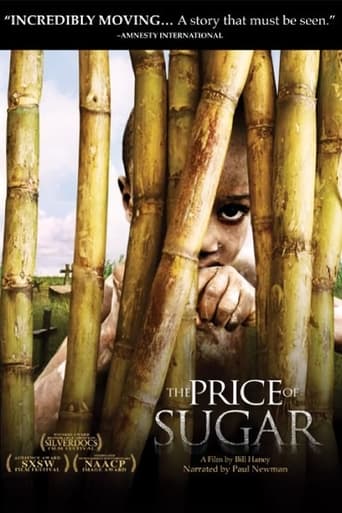Tabarnouche
Paul Newman's narration of The Price of Sugar occurred after he had moved from acting roles to voice roles and narration. It was the second-to-last film in which he had direct involvement before his death in 2008. The film made it onto the Academy's documentary feature shortlist for the Oscars.Newman's participation helped call attention to the plight of undocumented Haitians recruited by the Vicini family in the Dominican Republic to work on their sugar plantations in extraordinarily squalid and pathogenic conditions. Deprived of their identity papers on arrival, and looked down upon by many among the lighter-skinned local population, most sugarcane workers and their families could no longer leave the plantation, let alone the country.Father Christopher Hartley is a Catholic missionary priest who grew up in a wealthy Spanish family that moved to London about the time he was born. He later worked with Mother Teresa in Calcultta for many years and with Latino immigrants in NYC before beginning his ministry in the Dominican Republic. There he revived a church by developing close ties with the poorest of the poor. Gradually he drew international attention to the exploitation and mistreatment of the Haitians sequestered on vast plantations devoted to growing tall, perennial, sucrose-rich Saccharum grasses.The film is about Hartley, his campaign to improve the social and working conditions he encountered, his commitment to his parish, and the effect his doggedness had on the forgotten lives of migrant Haitians. He may have a bit too much photogenic chic and ease around camera crews for some tastes — suffer the upper-class priest to go unto the cutters and forbid his amour-propre not — but indisputably Hartley lived and worked for a decade in places others feared to dread.If you number among those who tire of seeing religion expropriated for political gain — or if you tend to find people who walk the talk against very long odds more noteworthy than various permutations of Idol shows — you might appreciate this fleeting glimpse behind the DR's PR: Tropical Island Nation Prospers by Rising to Meet Demand of First-World Neighbors.If your conscience has the wherewithal to trump comfort, prepare to squirm. The Price of Sugar shows how profiteers knowingly degrade the lives of unseen thousands so that a chunk of the world's largest crop, sugarcane, may wend its way from its raw state to refined American kitchens.
Seamus2829
If you have the same contempt for the ruling classes as I have,then this documentary (shot on video)is for you. It has to do with Haitians, who are forced to work in the Dominican Republic,cutting sugar cane for slave wages,who are treated like human cattle by brutal overseers, all for the wealthy sugar cane plantation owners (does the word exploitation strike a familiar chord here?). The documentary is largely centered on a Catholic Priest,who out of concern for these people,acts as a spokesman for their well being (while all the time making an enemy out of himself for the more xenophobic Dominicans). I generally walked out of this one at the end feeling sadness & pity for the downtrodden workers who are constantly being exploited,and burning disgust for the perps who should know better. The doc is narrated by the great Paul Newman (never once seen on camera,but his voice is in plentiful supply). This is a documentary that is a "must see" for human rights advocates,and just about anyone with a human heart.
normantjr
I haven't seen the movie. But I will. A free market doesn't rely on hundreds of millions of dollars of annual subsidies to prop up a business, as the sugar industry does. In fact, the sugar industry in the U.S. has contributed significantly to Florida's environmental degradation. They have horribly disfigured our democracy and they have influenced greatly our foreign policy towards Cuba, completely counter to American public opinion. A previous commenter must have some personal interest in the sugar industry, or they are completely ignorant as to the realities of what a true free market is. If the previous commenter who bashes the movie was honest and had some integrity they would turn their venom towards the sugar industry in Florida from which our citizens suffer the pollution of our democracy and the defiling of our environment. The history and truth is right there for anyone to read. See the movie.
xochristinaxo16
I have worked in these sugarcane fields, helping the people working there. I have seen and been told things that "researching" will not tell you. Of course living in the Dominican and getting attached to the Haitians you are going to have a bias especially if you're making a documentary. These people at times are forced into going to the Dominican. There are Dominican officials that there job is to find Haitians and bring them over. They are told that they are getting a good paying, decent job and then they are brought to the fields and aren't allowed to leave. There are guards with guns or machetes stopping them from leaving. How is that not slavery? Maybe before you go after a film you should visit and live in the culture and situation that is being filmed.


